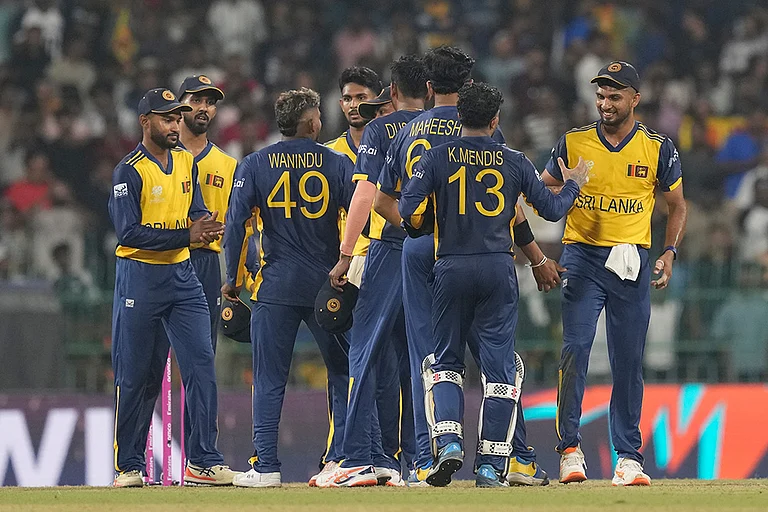"Under liberalisation, the process of the dismantling of the public sector is on, completely reversing the basis of self-reliant development...it hands over virtually free to the foreign and Indian monopolists assets which were created by the people with great sacrifice." —Excerpt from CPI(M) draft political resolution for the party congress in Calcutta
THIS is, of course, totally in tune with the Left view on disinvestment that has been stated umpteen number of times. The draft resolution even calls for mass mobilisation to counter the "dismantling of the public sector". This, when there are widespread accusations that the 21-year-old Left Front government is presiding over the dismantling of the public sector West Bengal State Electricity Board (WBSEB) in favour of private sector monopolist Calcutta State Electricity Corporation (CESC).
Even as preparations for the party congress are under way, the nearly 50-year-old WBSEB faces an unprecedented financial crisis that threatens its survival. It has to repay agencies like the National Thermal Power Corporation (NTPC), National Hydel Power Corporation, Damodar Valley Corporation and Coal India. Says WBSEB chairman Badal Sengupta: "The total dues would be around Rs 1,400 crore. NTPC, which stands to receive around Rs 600 crore from us, has threatened to cut off supply. We have explained that we ourselves stand to receive around Rs 410 crore from CESC and once we get this money, we can begin making repayments. Somehow, over a two-year period we have not been able to collect our dues from CESC."
Correspondence between WBSEB, which supplies power to the monopoly licensee CESC, shows that the latter has always been plying a host of reasons why it cannot pay the SEB: increasing operating costs, inadequate hikes in the tariff rate allowed by the government, and tardiness in collection of the controversial fuel surcharge from customers, high transmission and distribution loss, and so on. Efforts made by Outlook to talk to CESC bosses in Calcutta proved futile.
CESC supplies power to around 14 lakh consumers in greater Calcutta: around 1,100 MW daily, with a puja peak of around 1,300. Of this, CESC produces only around 450 to 500 MW and buys the rest at a low price from the SEB which it sells at a premium. The problem is it has not been paying for the power it buys and sells as a middleman even at the reduced rates.
Indeed, CESC has not even deposited the Rs 120 crore or so it collected from its consumers as electricity duty with every bill and which it is supposed to hand over to the state government as per law. Says an embittered power department official: "It seems there is a special law with the Left Front government when it comes to dealing with CESC, with people falling over themselves to agree to all its demands, however costly it may be for the consumers."
"Also, the finance department, headed by Asim Dasgupta and chief minister Jyoti Basu, have never really pressured CESC to repay its dues. The SEB has over 32,000 employees and cannot pay its workers the usual puja bonus, or their salaries will have to be cut, because of the financial crisis. Yet, the government could not care less for its own employees." In other words, the Basu government seems to be sending the message that a public sector concern can be sacrificed to help a private monopoly.
Even power minister Shankar Sen, credited with turning around the state's power sector, appears helpless. "The CESC is a mere licensee, but behaves more like an owner," he admits. "Time and again our letters and requests for money owed to us elicited no reply. It becomes very dif-ficult to work. Take the Rs 120 crore and more government duties collected by the company: I have drawn the attention of Asim Dasgupta to this highly irregular, illegal posture adopted by CESC. It has kept the money, and as a result, our rural electrification projects have been held up for months."
WHY is Basu so soft on CESC? It cannot be because of its efficiency, because this once blue-chip cash-rich company is now in the red. In fact, CESC has been dogged by controversy right from 1989, when the RPG group acquired it for a song, with an initial stake of only around 17 per cent of the equity. Observers point out that the takeover cost RPG only Rs 6 crore, as state government representatives on the CESC board looked the other way, giving the group control over assets worth more than Rs 1,000 crore. There have also been repeated allegations that RPG has siphoned money out of CESC to other unrelated group companies like Ganges Sugar, Rajasthan Containers and and RPG Netcom.
But the political patronage CESC enjoys from the LF is almost total. The story goes how the RPG group gave the LF advertising time at concessional rates on its cable network; critics say RPG helped the CPI(M) construct a plush new party office. Though Left sources and CESC officials don't talk about such matters, at least one CESC spokesman, a renowned Bengali novelist, spends much of his time in the new party office apart from writing in Left journals. Even the normally militant Left trade unions have always been silent about CESC.
Some time ago, a Bharat Chamber of Commerce note sent to the state government, protesting against frequent hikes in power tariff, pointed out that the cost of a CESC-sold unit was really Rs 3.68 paise, not Rs 1.22 as claimed by the company. For commercial consumption, the rate is Rs 4.50, and Rs 3.80 for high tension use. This, while CESC buys power at Rs 2 (which it has not been paying) per unit from the SEB. "Power is today the biggest bait to draw investors, as ours is the only surplus state. If power rates are hiked further, our only advantage will turn to be a disadvantage," said the note. But the state government allowed yet another hike after it received the note.
The CESC's transmission and distribution (T&D) losses have been rising over the years—it stands at around 19 per cent of total supply. But unlike Mumbai's power supplier BSES, which has saved Rs 44 crore by cutting T&D losses to around 11 per cent from 15 per cent a few years ago, CESC has been unable to tackle the problem, and has relied instead on tariff hikes to improve its fortunes. But when Congress MLA Atish Sinha wrote to Basu, expressing concern over the hikes, he wrote back that the company was within its rights. And when a CPI delegation complained, Basu retorted that the cost of everything had gone up, and, therefore, why not power.
Some months ago, a state government-appointed committee to probe tariff anomalies announced CESC had overcharged consumers Rs 120 crore. Then, another committee was appointed and the head of the first committee suggested the company stood to receive another Rs 97 crore from the people, eating his own words. No one has explained what really happened.
In the meantime, CESC has raised the cost of its 500 MW Budge Budge power project to Rs 2,600 crore from Rs 1,600 crore, citing price hikes. A committee found that at best, the cost could be around Rs 1,853 crore. A high project cost would entail higher per unit cost. Incidentally, the SEB-operated Bakreswar project is slated to produce units at a lower cost. The crowning irony: A 500 MW project was cleared in 1992 for Mumbai on the same day Budge Budge was cleared. It was finished in 44 months—CESC has barely budged in Budge Budge in 67 months.
Both Badal Sengupta and Shankar Sen feel that only intervention from the highest quarters—Basu—can help. Others point out that in view of the CESC's massive dues to official agencies, only substantial repayments can salvage these agencies. Otherwise public sector power units in West Bengal could be staring at total collapse.






















